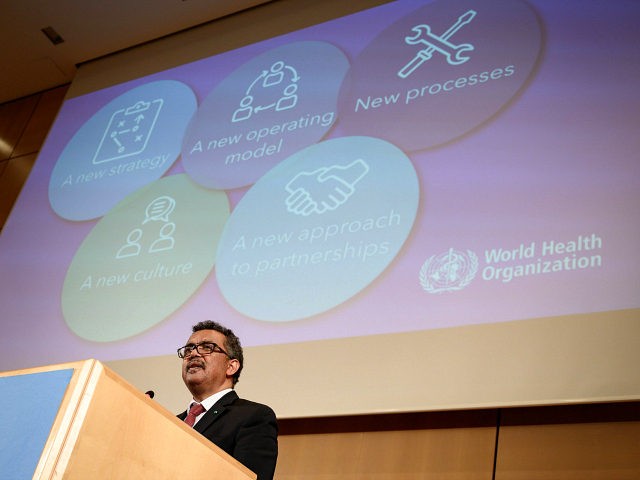The World Health Organization (WHO), a United Nations organization primarily funded by American taxpayers, spent nearly $192 million on travel expenses alone last year, a figure fueled by staffers misrepresenting their reasons for travel in breach of agency rules, the Associated Press (AP) reported this week, citing an internal audit.
WHO published the audit’s report on May 9, revealing that staffers sometimes broke the agency’s rules by opting to travel in business class without proper approvals and booking expensive last-minute tickets, among other issues.
The auditors determined, “WHO reported Travel expenses totaling USD 191.7 million for the year ended 31 December 2018.”
AP pointed out that the estimated $192 million figure marks a four percent decrease from 2017, when WHO vowed to rein in travel abuses in the wake of an investigation by the news agency.
Referring to misbehavior by staffers, the World Health Organization audit noted:
We see therefore a culture of non-compliance by staff involved in emergency operations. … Raising a (travel request) as emergency, even if it is not compliant with the criteria for emergency travel, shows a breakdown in controls and results (in a) waste of resources.
“Based on the difference in ticket costs for business class and economy class, savings could have been realized by the organization,” the report added, citing more than 500 travel requests in 2018 alone that likely broke the agency’s rules.
AP acknowledged that the abuses could drive away potential donors and partners. On Monday, the WHO began its week-long annual meeting in Geneva, asking for more money to combat the deadly Ebola outbreak in Congo and other devastating diseases including polio, malaria, and measles.
As mandated by internal regulations, the Chairperson of the Commission on Audit of the Republic of the Philippines carried out the annual independent analysis of WHO’s financial statements.
Auditors declared:
We recommend that WHO: (a) put in place mechanisms to ensure that travel quality checks and controls implemented in all regions are aligned with the Organization’s travel policies; (b) harmonize key areas of control in travel quality management particularly in ensuring that exceptions are justified and properly documented and the turnaround time of Travel Quality Specialists in verifying TRs [Travel requests] for approval is standardized to facilitate their prompt processing; and (c) subject travels in [the Europe regional office] to review by Travel Quality Specialist to ensure compliance with WHO travel policy.
The auditors found that World Health Organization staffers lied about the reasons for their travel to exploit loopholes in the organization’s policies, allowing them to fly business class, which tends to be more expensive than economy, even when they did not meet the criteria to do so.
Asked to comment on staffers misrepresenting their reasons for travel, WHO told AP on Monday that “travel is often essential to reaching people in need,” further claiming that a little more than half of its travel spending was devoted to bringing in outside experts and country representatives, often from developing countries, to carry out technical and other duties.
AP reported:
[WHO] added that numerous new measures were adopted in 2018 that aimed to make sure “staff travel is necessary, economical, appropriate and efficient.” The agency said there was an overall reduction in the number of business class trips by 49% for non-employees and a drop of 40% for WHO staffers.
“When staff travel, they do a range of things, including responding to emergencies, assessing countries’ emergency preparedness, implementing vaccine and other public health campaigns, training health workers and more,” the agency said.
Besides fighting diseases, the World Health Organization is charged with establishing global health policies and coordinating responses to health emergencies across the world.
“Its approximately $2 billion annual budget is mainly drawn from the taxpayer-funded contributions from member countries. The U.S. is WHO’s biggest contributor,” AP reported.

COMMENTS
Please let us know if you're having issues with commenting.